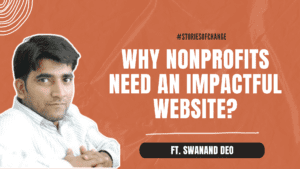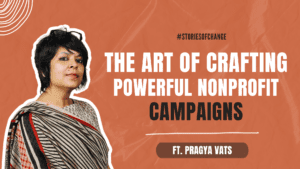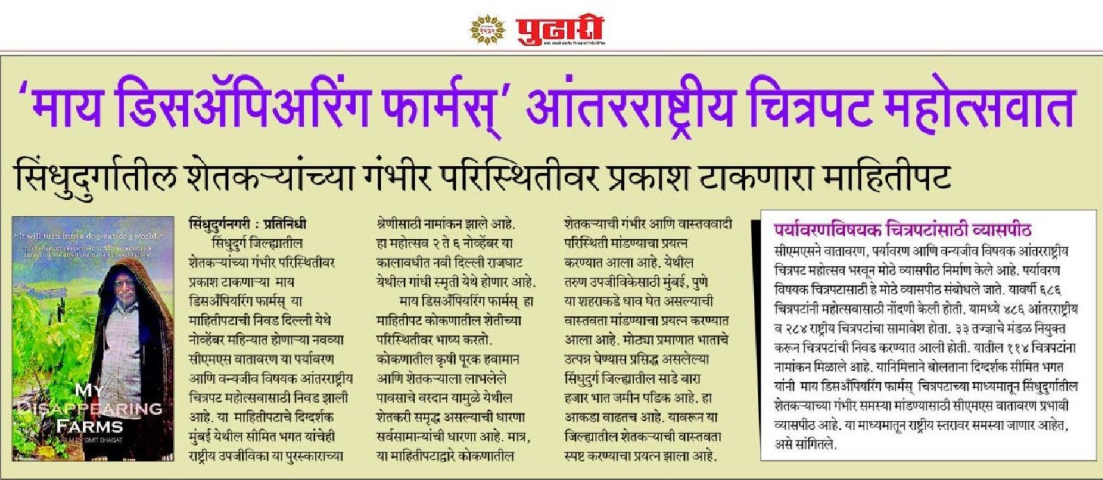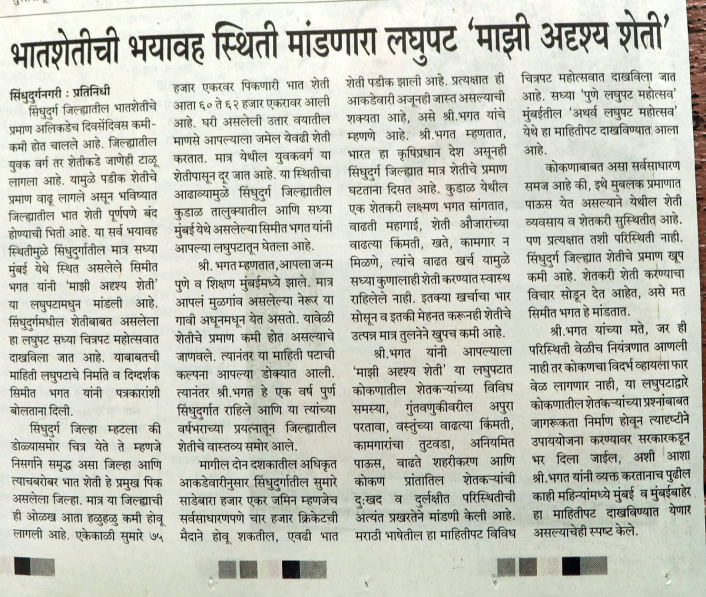In this episode of Stories of Change, Deepti shares her experience of cracking the highly competitive Chevening Scholarship and offers valuable tips for succeeding in the interview process. From the importance of thorough research to the power of storytelling, Deepti provides a wealth of practical advice for anyone looking to secure this prestigious award. Whether you’re a seasoned applicant or just starting out on your scholarship journey, this interview is not to be missed. Tune in now to learn from one of Chevening’s brightest success stories.
Deepti is an exceptional leader, a coach, and a mentor for young minds, especially for women. Over the last two decades, she has worked with several organisations including Seva Mandir, Save the Children, United National for Population Fund (UNFPA), and SOS Children’s Villages of India. Her last stint was with Udyogini as a Chief Operating Officer (COO). She received a Chevening Scholarship to study Globalisation and Development at the Institute of Development Studies at the University of Sussex.
Transcript of the Episode:
Simit: Hi Deepti, Thank you so much for agreeing to be on this podcast. It’s a pleasure to have you here.
Deepti: Hi Simit, thank you so much for having me. And the topic today, I think, is something that I am happy to talk about any day.
Simit: So, we know each other, I don’t know how many years, like 10 years, and we have some common connections. It’s always good to chat with people and get their insights on things like their experiences.
Deepti has been a Chevening Fellow. She went to IDS to study a master’s in globalisation and development. So today, we’re going to be talking about her experience of being a Chevening fellow and about studying in IDS, which also recently got ranked as number one in the global rankings for the seventh consecutive year for development studies. So congrats Deepti for this as well. Great.
So, let’s get directly into the topic. Do you want to share your experience? Because I’m sure, like you have gone through the process that people go through when they are applying for this scholarship.
Deepti: Yeah, it was a nerve-wracking experience, to be honest. Firstly, because of the scholarship application process, any application process, by the way. Secondly, speaking about my younger self ten years ago, a person with not as much exposure from the city, let’s say, or a Metro City like Delhi or Bombay, always worked in my hometown only.
Applying for the scholarship was nerve-wracking. Somewhere, I just wasn’t even sure whether I deserved it. Those challenges were more within me than they were outside of my environment. Honestly, when I applied for it, it wasn’t the only application or program I was aiming at. I landed on Chevening by chance, just two days before the deadline. My first feeling was an adrenaline rush, telling me, “Deepti, two days, no way, because you will have to write.” One, you will have to think and reflect on whether you are a fit for this Chevening scholarship. That’s one.
The second is that even if I have, let’s say, written something, and Simit, I want to highlight this, that, irrespective of our education, experiences, and skill sets, communication and articulation are underrated skills we don’t pay attention to. What I am trying to say here is that it’s almost like a sales job, right? You are selling yourself to somebody who sees the value you’re bringing. So that is where I was very, very nervous. Am I going to be convincing enough for the scholarship to consider me?
The last thing I was worried about is how am I going to get someone to review my application before I submit it? Because we go through this, writing something, in the flow, and we’ve read it so many times that we stop seeing the problems in it because, you know, this is just there. So for two days, how much break will I have to actually sleep over it and come back and review? If I were to give anybody advice today preparing for it, I would say, have enough time. It is essential. Have somebody review it.
“If I were to give anybody advice today preparing for it, I would say, have enough time. It is essential. Have somebody review it.”
Third, definitely submit it before the deadline. There are issues with the last-time submission because you will miss answering some questions or may misrepresent some information while submitting your application. In fact, I felt that I nearly made that mistake, that I had submitted my application with very small questions and answers, which I thought I had messed up in my head. I felt really devastated after submitting my application, thinking that I would never get through. It’s vital that somebody is reviewing your application, and you are presenting and articulating your application and your idea very clearly and in a concise manner.
Simit: Of course, this was a time before Chat GPT, right?
Deepti: Yeah, I still do not know how that functions. Yeah.
Simit: You also mentioned that you got it reviewed from someone. What did you write in your SOP which helped you get through?
Deepti: An SOP is essentially your sales document, basically telling the other person what it is that you’re selling to them. This implies having some value that you are bringing to the table and effectively communicating that. So, what does that SOP mean for any Chevening applicant? I’m sure some have written an SOP for the university, and you might think, “I have to take admission, why do I have to write this whole thing?” But this is how it works. The university is also considering why they should take this particular student, invest in them, prepare them for the future, and have 50 other people in the classroom. It’s about how classroom learning will be enriched. That’s essentially the reason why.
Also, it signifies the seriousness of your commitment to the course. I had also written SOPs for the universities where I had applied and got selected, receiving an unconditional offer. Now, should I actually copy that into my Chevening application? Many times, people have the ambition to do so, thinking, “I’ve written something good, I’ll just copy it.” Or they might think, “Get SOPs from four or five people, mix them up, and submit someone’s application here and someone’s there.” I’m sharing this because I’ve seen people doing it. I’ve seen some people I knew getting the applications of others, mixing them up, and then having someone review it to avoid plagiarism, which is a significant issue in the UK and many other places. There are software programs that can identify whether you’ve copied and pasted, and nobody would appreciate that because authenticity is crucial.
The way to go about it, in my opinion, is to first reflect on the ideas of leadership, a key focus in the Chevening scholarship. Where have I demonstrated leadership? How do I define leadership? Instead of providing beautifully ornamented leadership definitions, I defined how I perceive leadership and gave one or two concise examples.
The second focus in each Chevening application is on networking: how you build relationships and view professional relationships based on your experiences so far. How do you envision expanding these when given the chance to study at a UK university? The third aspect is what you will do with that knowledge—what you will bring back to the country. This involves presenting your vision for the short term, medium term, and long term, i.e., five years, 10 years, and 15 years. When someone invests in you, it’s not just an individual’s money; it’s the taxpayers’ money that the UK government is putting into you. Consider how you view that responsibility.
“When someone invests in you, it’s not just an individual’s money; it’s the taxpayers’ money that the UK government is putting into you.”
So that is the third part, which I also mentioned how I was looking at if I particularly studied this course. And then also the fourth aspect, which I think is the third, but the fourth aspect is the particular course that you’re thinking about. So what is it that in that particular course which is aligned to your values, which is aligned, your vision and future that you would envision, And within that how you see that entrepreneur thinking, the influence, and the leadership. So I think these are the four things and I would suggest anybody writing that SOP please write it from scratch number one, and two – be authentic and honest about it. It’s okay that you may not consider that this is grand. It doesn’t have to be grand. Whatever it is. If you’re proud of it, mention that.
Simit: I want to move on to the next part. You’ve worked with various nonprofits and you have been working in the development sector in various roles. So how is the experience of having gotten this Chevening scholarship? How has that helped you play a positive role in the communities that you’re working with?
Deepti: Yeah, I’m glad we’re talking about this now. Due to the Chevening Scholarship, you have spent time in a country which is very different from yours. So Chevening per se, actually the whole experience of experiencing the UK, the culture, the ethos of that country, the ethos of the academic experience there, and also it’s very multicultural and international that you have people from around the world.
Chevening is also the experience of UK culture. I mean, my class had people from seven different countries. And so, when you come back, it has made a huge impression on you about a lot of things. So I also came back, and I was, in one way, super enlightened. But at the same time, I would also say that I was also super lost. I think I came back during the year itself. There I started feeling that I need to explore a little bit more to be able to see how I best fit into the development sector and how best I can contribute. And one thing that was very clear around that time is that going back to the same job or the same organisation, the same town mostly is going to be limiting for me, this is how I think.
I’m not saying that this is the right thing to think or wrong way to think, but I decided to come back and actually explore different development frameworks. So I was working with grassroots. I decided to work with international organisations and also with, you know, not implementation, but more strategy policy, you know, advocacy sort of organisations I have chosen. I think to me, it was really important that I understood the entire framework by working in it. And also giving some other skills, which I didn’t have. So all of this, when I look at Simit, I think it wouldn’t have happened if Chevening did not happen.
Simit: So yes Deepti, you’re very right. One of the things that any international university, especially starting in Britain, for example, is that you get access to networks. And then how do you build onto those networks? How do you leverage those networks? Because at the end of the day, you have studied for a year or two years, but after that, it’s essentially these networks that help you in your professional life once you’ve come back and started working in this space.
So, yeah, you’re very right, and you made a very valid point on that front. If you had to share five tips or give advice to people who are applying for a Chevening scholarship, what would you say?
Deepti: Okay. So I think one is to start early. I think this is the first tip, so the Chevening program happens every year. Start writing your SOPs, applying to universities, and getting your unconditional offers. I think this is a good idea. Starting early also means that you have more time to reflect, which is actually the second tip that takes time.
Take time to reflect on who you are, what sort of person you are, what your journey is. How do you look at the leadership in you, irrespective of how people define leadership. I always say leadership is not the position; it’s not the hierarchy. It’s actually the natural disposition, how you are as a person and how you lead in terms of, you know, like a change that you see.
“Take time to reflect on who you are, what sort of person you are, what your journey is.“
The third point is, to be honest, that does not mean that you over boast and just go and say things that are not real because people are smart enough. If you do, let’s say, crack the application process to reach the level of the interview, personal interview, people will be able to see through you because they are smart enough to play on a gut, and we know when somebody lies. So I think honesty is the best policy.
The fourth is please write your SOP and get it reviewed by two-three people. Don’t be ashamed of the fact that they will see something in you. It will also help to open up the feedback.
And the last is that when you are submitting your application, have some time to breathe, don’t rush yourself there. Whether the interview happens or not, please don’t be disheartened because a lot of this did not happen this year. Don’t lose heart. You know, you can try again. I can tell you from my friend’s experiences, this Indonesian friend of mine said that she applied three times. She was determined and she got it the third time. So I think if you have that sort of grit, then you will. It’s okay if you didn’t apply, if you can get through this. There are many, many people who apply.
Also, try to understand the person or the Chevening program people sitting on the other side of the table. It’s not personal. It’s not about you. You know, anybody making an investment would want to make the best investment. So are you the best investment? So consider it like that.
And so that brings me to my final point, is that the SOP is not for you to flaunt things. The SOP is for you to really present your authentic self, your values, and your ideal, that vision that is something that would move anybody to invest in you. So yeah, I think these are a few things I would say.”
“SOP is not something for you to flaunt things. SOP for you is to present your authentic self.”
Simit: That was really helpful. I’m sure a lot of people will find this very useful, when they are applying for the Chevening scholarship. I want you to touch upon one part that we haven’t explored in any detail, which is the interview part, like how intense are these interviews and what was your experience like. Were you super prepared or was it like, let’s see how it goes and how it is for you?
Deepti: Interviews are always nerve-wracking, right? Because see, when you are writing something, you have time to think, to read what you’re saying and then revise it, delete it, make some changes again, sleep over it and look at it the next day. But interviews are not like that. I mean, irrespective of whatever mandate is given, do you prepare for it? Interviews are in real-time, on the spot. It’s like, if you miss the frame, you miss the frame.
So I think it was nerve-wracking for me. Also, I had travelled from Udaipur to Delhi because you’ve come to Delhi. And the British High Commission can be intimidating. I’m not saying it in a negative sense. Because earlier at that point of time you would have to leave your phone also.
And in fact even today I think when you go into a certain building or something, the phones are not allowed. You have to switch off your phone and it just makes you feel a little bit more intimidated. That’s the only thing. And then the second is the panel. Right. So I will tell you, there were, I think, four people on the panel.
There was one person who was not Indian and three other Indian people, and one was actually not from the Chevening office. Also, this person was representing that particular company that was investing or it was a funder for that particular Chevening program that year. So it is intimidating because there are four people, that are eight pairs of eyes that are looking at you, constantly judging you.
So I would say what I did was and I do it even today, we all have stage fears. And I think one thing that I always do is that the way I would put it is that I go and search for my authentic self. I always am very natural; in the sense, I just be myself, which means that if I’m very animated because I am a very animated person, so I’m animated, it doesn’t matter.
I smile a lot, even when people don’t smile back. So, I just go into that space, and I’m also trying to say what I really believe in. And I think that really does help. And so even when I had the question, I had to present my SOP in 3 minutes in one way.
So why do I think that I am a leader? What do I think that I will do with my course and why this particular course and why this particular university? And then, third, you know, what is it that I will do when I come back? And how do I think the network would help me and all of that?
So these are fairly four or five questions that will be there. And you’ve got to be for 3 minutes without any pause, basically. So I had prepared that, and trust me, it wouldn’t go the way you’ve planned because you would fumble. But you know, allow yourself to be kind to yourself. I would say that is most important. Allow yourself to be kind and stay true to yourself.
I think that’s the only thing that has ever helped me to crack any interview, not just Chevening, where I’ve been just myself. And if I did not know something, I have very honestly said that I do not know about this. What I have not studied, I have not read about this. I think that helps, rather than making things up. I think it just doesn’t help.
“If I did not know something, I have very honestly said that I do not know about this.”
Simit: Absolutely. Thank you. Before we end, there was one thing that I wanted to check. So before I pursued my master’s in IDS, I had worked for five years, so I had a fair understanding of working and getting actual work experience versus, let’s say, someone who is just starting out. So, what would be your advice? What are your thoughts?
Deepti: So my first very quick answer would be to do what works for you. Okay. I would tell you the second answer, which is long and more personal, is that I think that we are different people at different stages. I mean, in my twenties, I don’t think if I had done it, of course, it would have had a different outcome.
But I don’t think I knew who I was. So, I was much more in sync with my own being when I was in my thirties when actually I chose to do this, you know, the scholarship and the study abroad. I had 11, 12 years of work experience. So, having a decade of experience gave me an advantage during the scholarship.
“Having a decade of experience gave me an advantage during the scholarship.”
And then why still going made actually a huge difference for me. Now having done this, how do I look at it? One, taking a step back and reflecting the structure in an academic setting. I think it was a huge advantage. I did that. So I personally think that was a brilliant choice I made.
Of course, at the time I was doing it, I didn’t think like that. But then I sat in the classroom, and I was now looking at development theories. I was able to connect it with my personal experience. I could bring out those insights and share it with my colleagues there. And that meant that we had a much richer discussion because in my class, particularly in my class, the average age was actually 30 – 32, and that meant that everyone was coming with some life experience. So, the level of respect, the level of cooperation and collaboration was a different kind. So I think if I was a young person, I don’t think I would have had the ability to critically appreciate anything because I didn’t have that experience under my belt.
Simit: But thank you so much food for agreeing to be here. And it was wonderful to chat with you and you kind of took me back like 12 years because in my mind I’m at IDS. Yeah…
Deepti: So Robert Chambers participation workshops are something that I’ve missed. I really think that we should do something of that same sort here in India. And maybe Simit, but that is what we can do as ideas.
Simit: Absolutely, Let us figure a way out. Thank you so much.
Deepti: Thank you. Thank you so much for Simit, making me go back in time and reflect on this. Thank you.
Simit: Thank you.










